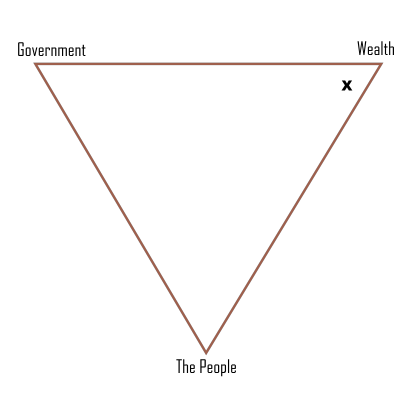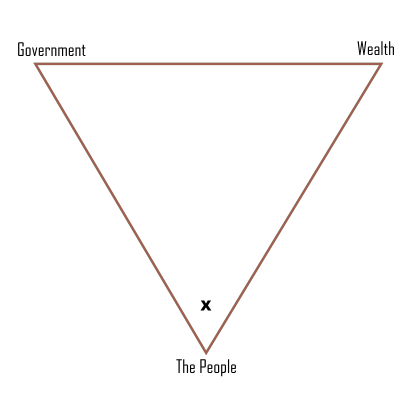THE LAST POST OR TWO have addressed the standard model within which health care reform is being debated.
That model is a simple continuum, with socialism on the left and capitalism on the right:
![]()
In practice, that model gives us only two choices—give the power to the wealthy, or give the power to the government:
![]()
But this model is deeply misleading, because it relegates us—we, the people—to a passive position: our only job is to cast a vote for either big government or wealth.
In fact, government and wealth are not the only two options in the field.
We, the people, do not need to be merely choosers, we can also be a choice.

We can ask, not just whether a given policy such as health care reform moves the "X" closer to wealth or the government, but whether it moves the "X" closer to us.
Does it, in this case, give us more control over our own health care?
Under the current system, the "X" is, on average, about here:

The power is almost entirely in the hands of the wealthy corporations. The average person is at their mercy.
If we want to change health plans, there had better not be anything wrong with us. If we don't like the plans our employer provides, we're pretty much stuck.
The health insurance companies tell us what they will cover, and when, and even whether we can have health insurance at all—and they can charge whatever they please.
The reason for this state of affairs is two-fold:
-
Medical care is not like buying a refrigerator.
If all the refrigerator manufacturers suddenly conspired to raise the cost of refrigerators to an absurd level, they would all go out of business. You and I would either make do with the refrigerator we already have, or do without one—perhaps go back to the ice box.
But if you or I have a heart attack, or a sick child, or a broken leg, we are not in the same bargaining position. We are not going to spend days or weeks shopping around, and we are not going to just decide to make do. We are going to pay whatever we have to.
This means that market forces don't work as well in the area of health care as they do elsewhere. The deck is stacked against us, the people, from the beginning, and unless we take special measures the capitalists will take advantage. -
The health insurance industry has been able to use its considerable political power to actually give it more freedom to manipulate the market than most industries have.
The net effect is that the very industry which, for the reason outlined above, might need more restrictions on how it controls its own market, actually has fewer restrictions—allowing it to take even greater advantage of its power over the consumer.
If consumers had more power—more choice over where they went to get health care, who their doctors were, what insurance company they used, and (most important perhaps) how much they paid, they would be able, by making millions of individual decisions, to exert some serious influence on the market, and bring the insurance companies in line.
So when we talk about health care reform it makes sense to ask, not just whether it will move the "X" left or right, but whether it will move the "X" downward.

Of course, we'll probably never get it that far down, but every step in that direction is not just a step in balancing the power of wealth and the power of government, but also a step toward limiting both.
Next time: two forms of power...






